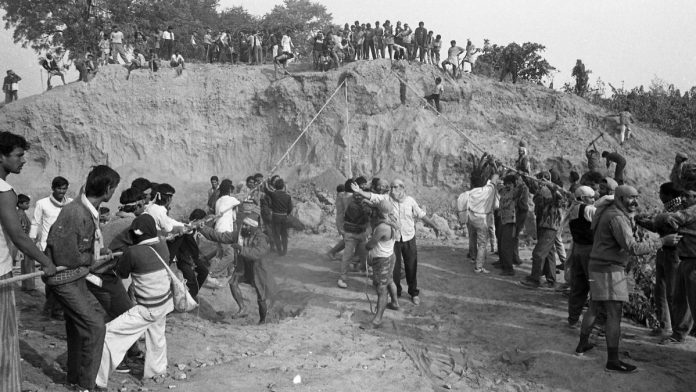What’s in a name? For many people in India after December 6, 1992, as in November, 1984, the world was easy to comprehend. You were either a Hindu, a Sikh or a Muslim. Your name said it all and did anything else really matter? But there were many many more human beings around then, as they are today, who simply, would not be pigeon-holed into an ‘us’ or ‘them’ compartment. Two years after thousands of deaths, and much more, followed the demolition, Combat spoke to four individuals whose life experiences and values can never be encapsulated in a name Hope amidst fear Its two years since the sacrilege in Ayodhya and the countrywide conflagration which followed. Ten years after the anti-Sikh carnage in the capital of the Republic and elsewhere, traumatized survivors are still crying for justice. November, 1984 and December, 1992 must never be forgotten for both showed how shaky the foundation of India’s secular-democratic state is. But nor must we fail to recognise hope amidst fear. In a civilization spiritually fertilised by the bhakti-sufi tradition, there never was and never will be a dearth of decent human beings. This special year-end edition of Communalism Combat felicitates the true inheritors of our compassionate tradition even while it commemorates the victims of prejudice and hatred. For the first time in my life, with the demolition of the Babri Masjid the realisation hit me that barely below the surface, prejudice was very deeply ingrained’. RAVI GUPTA |

RAVI GUPTA
Chairman, National Film
Development Corp
Do you know why the demolition of the Babri Masjid disturbed me? Quite apart from for all the obvious reasons, I found a large number of people – persons you and I would normally term secular – applauding the event.
For the first time the realization hit me that barely below the surface, prejudice was very deeply ingrained. And for the first time in my life I began searching for its source.
I started thinking about my upbringing, my school life, where there were both Hindus and Muslims. It is from a very young age that we are discouraged from mixing and eating with Muslim children. I recall a particular incident.
I was about six-years-old, studying in the second standard. One of my closest friends was a Muslim. We always shared our lunch together, under a tree in the far corner of the school compound.
One fine day, I remember us asking another friend, a Hindu, from the class to join us. He was very excited when we approached him, then there was this sudden hesitation on his face and he muttered, “You carry on.”
“Why, what is it?” we persisted, not letting him go until he explained. “He is a Muslim,” the boy said pointing to my friend. “So what?” I demanded. “My mama has told me not to eat my food with Muslims.” he said.
This is terrible. Whatever the reasons and justifications that adults find for planting these taboos, imagine what is happening to children’s lives? We are only imposing limitations, restrictions, and building barriers.
It is this episode that I remembered in December 1992. For the first time after this boy walked away saying he wouldn’t eat with us, the thought crossed my mind, “Was I doing something wrong?” And believe me that day the food would not go down my throat.
Fortunately, for me this has all passed. And my friend is still one of my closest friends, now a well-established doctor in Pune. But are all people brain-washed from childhood so lucky?
It is not religious prejudice alone. Often it takes other forms, prejudice against a lower economic class or caste. What happens for instance when a child from an upper middle class background becomes very friendly with a “servant’s child” and elders try to stop the two playing together?
Another incident also comes to mind. An old aunt of ours who lived in Jammu visited us often. Everytime the woman who cleaned our house came to work, this aunt would retreat, mumbling, to the inside room. We found this quite shocking. But at the same time, as children, derived some vicarious pleasure from this old woman’s distress.
This narrow world vision seems so natural to the adults. But we are creating walls where none exist. The taboos imposed by adults affect children negatively as does peer pressure and pressure of societal beliefs later on.
A great deal of damage takes place at this stage. And it is here that we need to tackle it. The response to prejudice must be organised at this level. It is in our homes, within our families, that these prejudices are being taught. How can a reorientation take place? The cycle has to be broken.
The time has come when much more than passive secularism is needed. The good are not doing enough. There is a fear to come out and take a stand. Hence the mad fringe rules the roost.
In December 1992, we from filmdom, missed an opportunity to convey a message from the world of India cinema which is a microcosm of multi-cultural, pluralist India. It was the day after a delegation of prominent film personalities (present in the capital for the Film Festival) had met Prime Minister Narasimha Rao to protest against the demolition and outbreak of nationwide violence. I suggested to my colleagues – top stars in the film industry – that each one of us commit ourselves to adopting one orphan victim of the communal holocaust who belonged to any community but one’s own.
Through that one gesture we could have demonstrated what the Indian cinema world stood for. Unfortunately, none took up the suggestion. We missed a good opportunity to send out a message against prejudice.
(As told to Teesta Setalvad, co-editor, Communalism Combat)
NOV-DEC, 1994, Monthly Journal, Communalism Combat, Cover Story